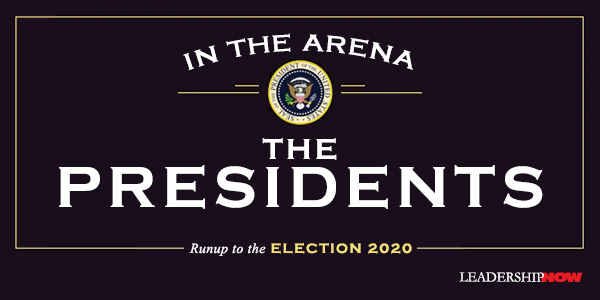 |
 |
11.02.20

Thoughts on the Presidency
WITH the presidential election of 2020 upon us, here are some thoughts about the presidency: “Despite all of the trappings of power—the big house on Pennsylvania Avenue, Camp David, Air Force One, never having to sit in a traffic jam (ever!)—the president is in charge of an entity over which he has fairly limited power. This is, of course, exactly the way the Founding Fathers wanted it. And yet, try telling that to the American public or to the world when something goes really wrong. As we have seen, large-scale governmental failure becomes presidential failure, whether the president likes it or not.” — Elaine Kamarck, Why Presidents Fail “One can write endlessly about the differences between the first and twenty-first centuries A.D. But then as now, there is no greater attribute for a ruler than humility built on an accurate assessment of his own limits, from which the finest cunning emerges.” — Robert Kaplan, Warrior Politics “In selecting those who might occupy the most important office in this country—the Presidency—we put our potential leaders through a process that is both strange and brutal. The people who might make crucial decisions about war and peace, about our taxes, who will have enormous effect on the quality of our lives, our social order, the civility of our public discourse, undergo an experience from which few human beings could emerge whole. Some do not.” — Elizabeth Drew, The New Yorker, Running, November 23, 1975 “The President is, first of all, a manager.” — Peter Drucker, How to Make the Presidency Manageable, Fortune November 1974 “You can’t just appoint smart people.” You have to have a team and operate as a team, and any corporation would have a training program to acculturate people. — Newt Gingrich, 2011 “Blaming the bureaucracy is an easy way to gloss over the failures of government, yet running a government without the support of the bureaucracy is like running a train without an engine.” — Stephen Hess, Organizing the Presidency “No real-world human being brings to the U.S. presidency the range of attributes necessary for full success in the job”— James Fallows “Elections these days often seem more about who is to blame than who is to govern. New governments end up unpopular rapidly after their ascent to power, and very quickly the debate focuses on who or what is to be voted out rather than who is to be voted in. Voters are less inclined to see their selection as a long-term contract with a candidate or party and more likely to see it as resembling a transaction with a used car salesman.” — Tyler Cowen, The Complacent Class “In a democracy, someone who fails to get elected to office can always console himself with the thought that there was something not quite fair about it.” — Thucydides, History of the Peloponnesian War “The ruling power is always faced with the question, ‘In such and such circumstances, what would you do?’, whereas the opposition is not obliged to take responsibility or make any real decisions.” ― George Orwell
Posted by Michael McKinney at 07:29 AM
|
BUILD YOUR KNOWLEDGE
 

How to Do Your Start-Up Right STRAIGHT TALK FOR START-UPS 
Grow Your Leadership Skills NEW AND UPCOMING LEADERSHIP BOOKS 
Leadership Minute BITE-SIZE CONCEPTS YOU CAN CHEW ON 
Classic Leadership Books BOOKS TO READ BEFORE YOU LEAD |